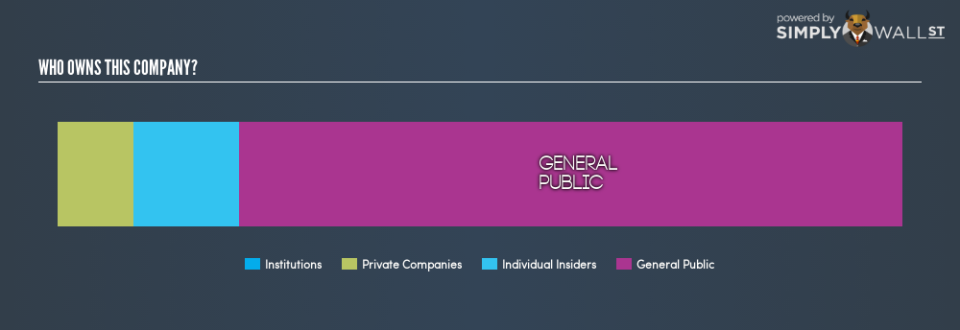Could The Argonaut Resources NL (ASX:ARE) Ownership Structure Tell Us Something Useful?

Every investor in Argonaut Resources NL (ASX:ARE) should be aware of the most powerful shareholder groups. Insiders often own a large chunk of younger, smaller, companies while huge companies tend to have institutions as shareholders. Warren Buffett said that he likes ‘a business with enduring competitive advantages that is run by able and owner-oriented people’. So it’s nice to see some insider ownership, because it may suggest that management is owner-oriented.
Argonaut Resources is a smaller company with a market capitalization of AU$28m, so it may still be flying under the radar of many institutional investors. Taking a look at the our data on the ownership groups (below), it’s seems that institutional investors have not yet purchased shares. Let’s delve deeper into each type of owner, to discover more about ARE.
Check out our latest analysis for Argonaut Resources
What Does The Lack Of Institutional Ownership Tell Us About Argonaut Resources?
Institutional investors often avoid companies that are too small, too illiquid or too risky for their tastes. But it’s unusual to see larger companies without any institutional investors.
There are many reasons why a company might not have any institutions on the share registry. It may be hard for institutions to buy large amounts of shares, if liquidity (the amount of shares traded each day) is low. If the company has not needed to raise capital, institutions might lack the opportunity to build a position. It is also possible that fund managers don’t own the stock because they aren’t convinced it will perform well. Argonaut Resources’s earnings and revenue track record (below) may not be compelling to institutional investors — or they simply might not have looked at the business closely.
Argonaut Resources is not owned by hedge funds. Our information suggests that there isn’t any analyst coverage of the stock, so it is probably little known.
Insider Ownership Of Argonaut Resources
While the precise definition of an insider can be subjective, almost everyone considers board members to be insiders. Management ultimately answers to the board. However, it is not uncommon for managers to be executive board members, especially if they are a founder or the CEO.
I generally consider insider ownership to be a good thing. However, on some occasions it makes it more difficult for other shareholders to hold the board accountable for decisions.
It seems insiders own a significant proportion of Argonaut Resources NL. It has a market capitalization of just AU$28m, and insiders have AU$3.5m worth of shares in their own names. This may suggest that the founders still own a lot of shares. You can click here to see if they have been buying or selling.
General Public Ownership
The general public, who are mostly retail investors, collectively hold 78% of Argonaut Resources shares. With this size of ownership, retail investors can collectively play a role in decisions that affect shareholder returns, such as dividend policies and the appointment of directors. They can also exercise the power to decline an acquisition or merger that may not improve profitability.
Private Company Ownership
We can see that Private Companies own 9.1%, of the shares on issue. It might be worth looking deeper into this. If related parties, such as insiders, have an interest in one of these private companies, that should be disclosed in the annual report. Private companies may also have a strategic interest in the company.
Next Steps:
It’s always worth thinking about the different groups who own shares in a company. But to understand Argonaut Resources better, we need to consider many other factors.
I like to dive deeper into how a company has performed in the past. You can access this interactive graph of past earnings, revenue and cash flow for free .
If you would prefer check out another company — one with potentially superior financials — then do not miss this free list of interesting companies, backed by strong financial data.
NB: Figures in this article are calculated using data from the last twelve months, which refer to the 12-month period ending on the last date of the month the financial statement is dated. This may not be consistent with full year annual report figures.
To help readers see past the short term volatility of the financial market, we aim to bring you a long-term focused research analysis purely driven by fundamental data. Note that our analysis does not factor in the latest price-sensitive company announcements.
The author is an independent contributor and at the time of publication had no position in the stocks mentioned. For errors that warrant correction please contact the editor at editorial-team@simplywallst.com.


